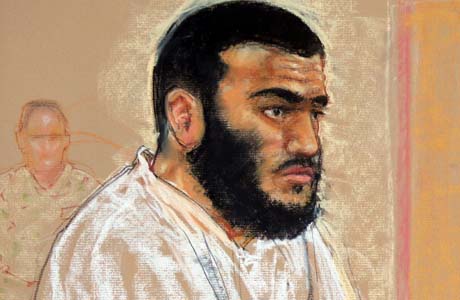OTTAWA – The Canadian government could be on the hook for a multimillion-dollar payout to Omar Khadr, after the Supreme Court of Canada appears to have strengthened his hand in a long-standing civil lawsuit by declaring his charter rights were violated.
The Guantanamo Bay detainee, in a damages suit launched six years ago, has recently bumped up his claim to $10 million from $100,000, court documents show.
The federal Justice Department acknowledges in separate court records that Khadr’s maltreatment by a Canadian official, who questioned him in Cuba while knowing he had been softened up through sleep deprivation, could play a role in the outcome of the lawsuit.
"It may be a relevant factor in those proceedings," federal lawyers wrote in a brief to the Supreme Court as it considered whether to order the government to seek repatriation.
The civil suit is still "many years away from resolution," cautioned Khadr’s lawyer, Nathan Whitling.
"That action is still out there but they’re not about to write us a cheque for it," said Whitling, who asserted that the Supreme Court declaration that Khadr’s charter rights have been violated should bolster his case.
The Federal Court gave Khadr permission last spring to increase the amount of his claim following revelations a Foreign Affairs official knew Khadr had been subjected to a "frequent flyer" sleep-deprivation program to make him less resistant to questioning.
The Supreme Court, in a ruling last week that refused to order a repatriation request, found nonetheless Canadian officials violated Khadr’s constitutional rights by passing along the fruit of their interviews with him in 2003 and 2004 to American officials, presumably to be used in building a case against him.
Foreign Affairs Minister Lawrence Cannon, in confirming this week that the government will not seek Khadr’s repatriation, said Justice Minister Rob Nicholson is working on other options to rectify the government’s charter violation.
Nicholson’s office did not respond to a request for comment.
NDP justice critic Joe Comartin said a cash payout should be on the table, along with a commitment from Canadian officials to ask the U.S. for assurances that the ill-gotten information obtained from Khadr will not be used against him.
"The thing they should do is (give him) a whole chunk of money, much as they had to (with) Maher Arar, because there is nobody who believes Omar Khadr has any chance of being acquitted in a military tribunal and he will probably be sentenced to a lengthy period of time in prison in the U.S.," he said.
"They could compensate him for all those years that he is going to lose."
Khadr, who was born in Toronto, was 15 years old when he was captured by U.S. forces in Afghanistan in July 2002 and sent to the U.S. military unit at Guantanamo Bay, Cuba.
He is accused of murder as a war crime for allegedly throwing a grenade that killed a U.S. army medic. His military trial is scheduled for July.
The $10 million sought by Khadr is the same amount that the government paid Arar to compensate him for Canadian authorities passing along faulty intelligence to the U.S., which a judicial inquiry found was likely responsible for his arrest during a stopover at a New York airport, resulting in deportation to a Syrian jail for one year.
In awarding Arar compensation, Prime Minister Stephen Harper conceded it was in the ballpark of the amount they would have likely had to pay out in a civil lawsuit.
Cheryl Milne, a constitutional law expert and child advocate, agreed the Supreme Court declaration will strengthen Khadr’s civil suit.
"There is certainly potential . . . but it is hard to imagine how money is going to make it better while he’s still there at Guantanamo," said Milne, executive director of the David Asper Centre for Constitutional Rights at University of Toronto.
The two sides in the lawsuit were scheduled to meet last month with Federal Court Justice Richard Mosley, who is overseeing the case, but they postponed after learning the Supreme Court was about to hand down its repatriation ruling.
Khadr’s lawyers, in a revised statement of claim filed in Federal Court, alleges he has been tortured through use of sleep deprivation, deprived of his charter rights and legal rights under international law, and faces a military commission that has the authority to impose the death penalty.
The government counters in a written rebuttal that it "denies that the plaintiff has suffered any loss or damage as a result of any Canadian officials, as alleged, or at all."




Comments